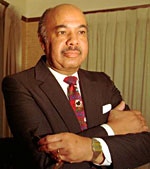|
|
|
WHAT DOES RACIAL PRIVACY REALLY MEAN?
The Debate Over Californian Ward Connerly's Latest "Color Blind" Ballot Initiative By J. Douglas Allen-Taylor Originally published at www.africana.com October 29, 2002
America is sometimes described as a giant pinball machine, with California at its front end. Social, economic and political issues tend to rattle around in the nation’s largest state for a while, either to die for want of popular support, or to get propelled out to set the agenda for the rest of the country. A good argument can be made that it was California’s 1978 anti-tax Proposition 13 which opened the door for the Reagan tax revolution, two Bush presidencies, and the tilting of the Democratic Party to the right. If the pinball analogy is true, then the man with his hands on America’s racial buttons these days may be controversial University of California regent Ward Connerly. Six years ago, Connerly was the point-man in California’s ballot Proposition 209, which outlawed affirmative action in government programs in the state. Connerly’s latest endeavor is something he calls the Racial Privacy Initiative (RPI), which recently qualified for inclusion on California’s March, 2004 ballot. (The official ballot title will be the Classification by Race, Ethnicity, Color or National Origin initiative.) If passed, RPI would bar the state from classifying citizens by race, ethnicity, color, or national origin in the areas of education, public contracting or public employment. Exemptions to such classifications allowed in the initiative would include medical research, compliance with federal law, and certain law enforcement activities. Conservative heavyweights such as George Will, Thomas Sowell, and Pete Du Pont have already written columns in support. Connerly, a successful African-American businessman and the chairperson of the California-based American Civil Rights Coalition, believes that America should do away with what he calls its "obsession (with the) artifice of race," and argues that banning such categories in state government activities is a necessary first start. "The destiny of California is a multi-ethnic, pluralistic society in which [racial] classifications will die of their own weight," he says. Calling the Racial Privacy Initiative a "transition to that point," he contends that the initiative only "accelerates the inevitable." "RPI is not about trying to bring about a color-blind society. It’s about a person’s relationship with their government. A government cannot treat its citizens as equals if it is trying to classify them and to make some determination as to how they are going to be treated with regard to that classification. The word ‘classification’ itself sounds odious. The government should not be classifying its people. While arguing that "groups like the NAACP want to keep these classifications for purposes of political influence and political power," Connerly says that "in the real world, race is dissipating faster than it is in government. It’s government that’s clinging to these classifications." While it is debatable whether or not the classification of race is dissipating in the real world or even in the nation’s largest state, opposition to Connerly’s proposals does not appear to be on the decline. Civil rights organizations such as the national office of the NAACP, the American Civil Liberties Union, and the California Coalition for Civil Rights have already come out against the RPI, as well as several legal rights organizations, including the National Lawyers Guild, the Lawyers Committee For Civil Rights, the Asian law Caucus, and the Mexican-American Legal Defense Fund. Skittish about losing Latino votes in a heavily-Latino state, even the California Republican Party has backed off from supporting the measure. Much of the often-heated argument against the RPI centers around the initiative’s provision that would ban the collection of race data on government forms. In response to the national movement against discriminatory police traffic stops and car searches, for example…the Driving While Black and Driving While Brown phenomenon…several California cities have begun tracking police stops by race. Such tracking would cease if RPI passes. "Connerly’s proposal increases immeasurably the difficulty of collecting data to show whatever [African-Americans’] experience is today," says Dr. Yvonne Scruggs-Leftwich, Executive Director and COO of the Black Leadership Forum. The Forum is a Washington-based confederation of several civil rights and political organizations, including the National Urban League, the National Council of Negro Women, the Congressional Black Caucus, and the National Conference of Black Mayors. "You won’t be able to say how many people are being employed in top-level jobs in state government, or how many people are receiving benefits of the tax dollar. You won’t be able to say that any more because you won’t know. And where court cases, especially, hang on whatever the continuing [racial] experience is, there will be no data if Ward Connerly has his way. At least about the public sector." Connerly himself concedes that despite calling for an end to racial profiling, the RPI will have little effect on police who choose to make excess stops of minority citizens. "In a practical sense," he admits, "RPI’s effect will depend on how law enforcement applies it. No matter how much you have on the books laws that say we are opposed to racial profiling, certain law enforcement people–if they are going to pull people over based upon the way they look–will probably continue to do that. But at least you will now have, in the Constitution, a policy which says ‘we oppose this.’" Still, Connerly says that the cost of diminished civil rights enforcement is acceptable. "My belief in doing away with classifications is so strong [and] the justification for doing away with the classification lines up so overwhelmingly that I would be in favor of doing away with the classifications even if it diminished the ability to detect racial profiling." That brings a quick retort from Scruggs-Leftwich. "I don’t much care whether he is willing to pay that price. He’s made choices about what he’s willing to sacrifice, and those are choices he’s entitled to make. [But] I think Ward Connerly at his best is naïve. The things he brings up do not go to the heart of why there is discrimination." Naïve or not, Connerly’s American Civil Rights Coalition, and the conservative movement that backs it both in California and nationwide, has already demonstrated that it will be able to organize significant grassroots support and financial muscle to promote the initiative. The group collected close to 700,000 valid signatures to put RPI on the 2004 California ballot, and had raised more than $1.5 million in donations by mid-year. Money is often the key to political victories in populous California, where television ads count more in a campaign than handshaking and doorknocking. Even without any ads yet running, a Field Poll taken last spring found that California voters favored the measure by a 3 to 2 margin. And if the Racial Privacy Initiative passes in 2004? On this point, opponents and proponents appear to agree. According to a resolution passed at this year’s national convention of the NAACP, it would be "bad public policy for California and a bad precedent for the nation." According to Connerly, it would "trigger a debate in the nation about the legitimacy of race." One way or another, in other words, the nation will never be the same.
|

